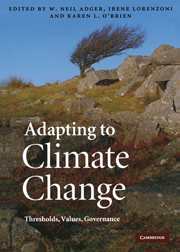Book contents
- Frontmatter
- Contents
- List of contributors
- Preface
- 1 Adaptation now
- Part I Adapting to thresholds in physical and ecological systems
- Part II The role of values and culture in adaptation
- Part III Governance, knowledge and technologies for adaptation
- 20 Whether our levers are long enough and the fulcrum strong? Exploring the soft underbelly of adaptation decisions and actions
- 21 Decentralized planning and climate adaptation: toward transparent governance
- 22 Climate adaptation, local institutions and rural livelihoods
- 23 Adaptive governance for a changing coastline: science, policy and publics in search of a sustainable future
- 24 Climate change, international cooperation and adaptation in transboundary water management
- 25 Decentralization: a window of opportunity for successful adaptation to climate change?
- 26 Adapting to climate change in Sámi reindeer herding: the nation-state as problem and solution
- 27 Limits to adaptation: analysing institutional constraints
- 28 Accessing diversification, networks and traditional resource management as adaptations to climate extremes
- 29 Governance limits to effective global financial support for adaptation
- 30 Organizational learning and governance in adaptation in urban development
- 31 Conclusions: Transforming the world
- Index
- References
29 - Governance limits to effective global financial support for adaptation
Published online by Cambridge University Press: 31 August 2009
- Frontmatter
- Contents
- List of contributors
- Preface
- 1 Adaptation now
- Part I Adapting to thresholds in physical and ecological systems
- Part II The role of values and culture in adaptation
- Part III Governance, knowledge and technologies for adaptation
- 20 Whether our levers are long enough and the fulcrum strong? Exploring the soft underbelly of adaptation decisions and actions
- 21 Decentralized planning and climate adaptation: toward transparent governance
- 22 Climate adaptation, local institutions and rural livelihoods
- 23 Adaptive governance for a changing coastline: science, policy and publics in search of a sustainable future
- 24 Climate change, international cooperation and adaptation in transboundary water management
- 25 Decentralization: a window of opportunity for successful adaptation to climate change?
- 26 Adapting to climate change in Sámi reindeer herding: the nation-state as problem and solution
- 27 Limits to adaptation: analysing institutional constraints
- 28 Accessing diversification, networks and traditional resource management as adaptations to climate extremes
- 29 Governance limits to effective global financial support for adaptation
- 30 Organizational learning and governance in adaptation in urban development
- 31 Conclusions: Transforming the world
- Index
- References
Summary
Introduction
The United Nations Framework Convention on Climate Change (UNFCCC) is one of only a few global environmental treaties with near universal membership (192 Parties). It includes all main contributors to climate change as well as the majority of those that will need to adapt to the adverse effects of climate change. One of the commitments of developed countries under the UNFCCC is to assist developing countries in meeting costs of adaptation to these adverse effects (Article 4.4). The UNFCCC has therefore developed a dedicated system for providing global financial support for adaptation to climate change in developing countries.
As the need for such adaptation is becoming increasingly clear, the World Bank (2006) notes that the total amount of funding for adaptation projected to be available to developing countries by 2012 falls well short of the estimated amounts needed to cover its costs, and considers this shortfall to be the major impediment to adaptation funding:
An assessment of the current financial instruments shows that, while they are technically adequate to respond to the challenge of achieving climate-resilient development, the sums of money flowing through these instruments need to be substantially increased.
(World Bank, 2006, p. 40.)However, developing countries have expressed the additional concern that the complexity of current funding arrangements constrains their access to money (Decision 3/CP.12; UNFCCC, 2006a, 2007a, 2007b). This would challenge the World Bank's view that the current financial instruments are ‘technically adequate’.
- Type
- Chapter
- Information
- Adapting to Climate ChangeThresholds, Values, Governance, pp. 465 - 475Publisher: Cambridge University PressPrint publication year: 2009
References
- 4
- Cited by



